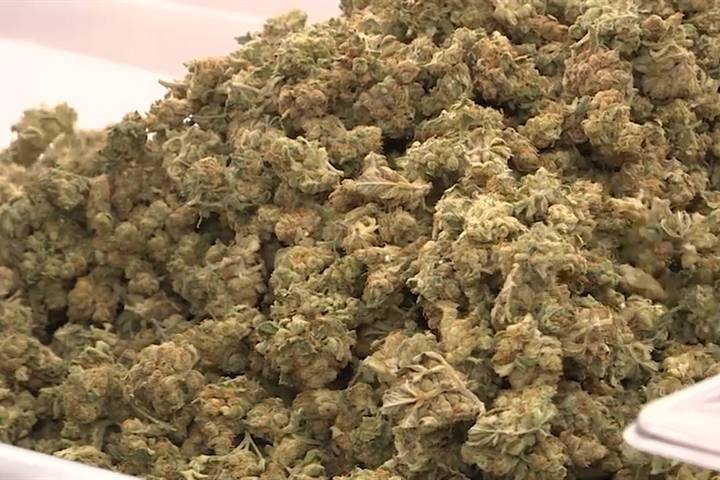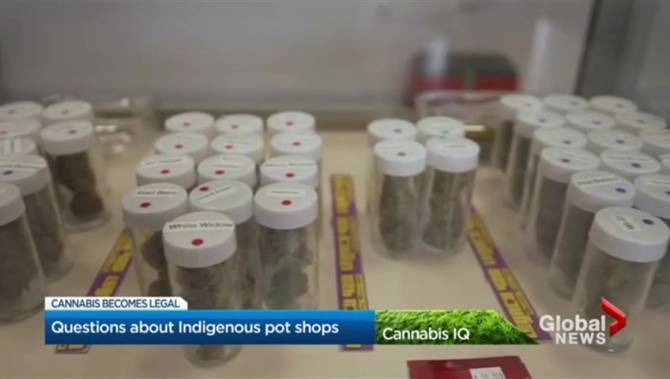

If you are looking to purchase cannabis from a store in the Kingston area, there are plenty of options west of the city on Tyendinaga Mohawk Territory, a community of roughly 4,000 people.
But if you were to buy cannabis from one of the more than 50 dispensaries that have set up shop on Tyendinaga, would your purchase be a legal one?
READ MORE:
Ontario government changes rules for pot shops, only 25 stores to open April 1
That depends on who you ask.
Provincial Attorney General Caroline Mulroney told Global News in October that unlicensed dispensaries and production facilities are illegal, with the province’s online store the only licensed shop to sell cannabis in Ontario.
However, businesses like Legacy 420, located on Tyendinaga Mohawk Territory, insist they are able to operate legally under their own regime.
“Provincial and federal cannabis laws don’t apply on Tyendinaga,” said Jordan Brant, marketing director for Legacy 420. “The local government and band council have their separate cannabis laws so that doesn’t affect us on Mohawk territory.”
READ MORE:
Weed shops welcome: City council green-lights retail pot stores in Ottawa
On Oct. 17, the Mohawks of the Bay of Quinte introduced interim cannabis regulations, stating that their internal regulatory body has the sole ability to sanction cannabis stores on the territory.
“A license issued by a provincial or other regulatory authority outside of the First Nation’s lands and Territory has no validity within the lands and Territory unless the license holder has also been authorized under this regulation,” the regulation reads.
The purpose of these rules was to establish self-governance when it comes to cannabis production and sales on the territory.
“We want to ensure that any development of future laws or regulations respect our jurisdiction, rights and interests in the economic and social benefits of cannabis, while protecting our community,” said a news release from the Mohawks of the Bay of Quinte released Oct. 17.
According to Mulroney, there have been meetings with representatives of various Indigenous communities, and she is working with the Ministry of Finance as well as the Minister of Indigenous of Affairs to make sure that the province is responding to the concerns of individual communities.
But as it is right now, Mulroney says that no cannabis store without a licence from the Ontario government is operating legally.
READ MORE:
Ontario First Nations fight for cannabis rights
The Mohawks of the Bay of Quinte noted that the regulations they presented in mid-October are “temporary,” since talks were underway with Canadian governmental bodies to work out an agreement on how First Nations communities will interact with the cannabis plant.
“We understand that this is the beginning of the process,” the news release read. “In order to ensure that the community is involved, we plan to organize a series of community consultations that will assist in developing our regulatory regime.”
The release promised to have permanent regulations up for a vote before April 2019, when cannabis stores will be allowed to open in Ontario.
At the time of that release, the Ontario government did not have a limit on how many stores could open in the province, but on Dec. 13, the government announced it will limit the number of cannabis stores opening province-wide on April 1 to 25, with licences to be distributed through a lottery system.
The decision sparked outrage from NDP deputy leader Sara Singh.
READ MORE:
Chances for Kingston cannabis store dwindle after Ford announces 25 stores in Ontario
“The Liberal plan to open just 40 cannabis storefronts was a disaster waiting to happen — an open invitation to the illegal cannabis market to operate in Ontario,” Singh said in a statement following the announcement.
“Doug Ford’s change of plan to restrict the number of cannabis stores to just 25 is going to make that problem so much worse.”
Meanwhile, business is booming in Tyendinaga. According to Brant, there has even been an increase in customers since cannabis legalization on Oct. 17.
He says this is because of the demand for cannabis products and the fact that people have not had instant access to the products through other means.
Accessing legal cannabis in Ontario has been challenging in some cases. With the change in regime from the Liberals to the Progressive Conservatives, the province’s immediate plan to distribute cannabis after Oct. 17 switched from having LCBO-like dispensaries to sales being limited to online purchases at the Ontario cannabis store.
WATCH: Ontario Indigenous communities concerned about cannabis laws

In some cases, orders have been slow to be delivered to customers in Ontario, and the provincial government’s latest move to limit cannabis licenses to 25 was due to a worry over supply.
Stores on Tyendinaga Mohawk Territory have tens of fully-operational dispensaries with an established customer base.
As for when provincially-sanctioned brick-and-mortar storefronts will open for people looking to purchase cannabis in person, municipalities have until Jan. 22, 2019, to let the province know whether they will opt in or out of allowing cannabis stores in their community.
READ MORE:
How one simple change let a province sell residents live pot plants
If the Alcohol and Gaming Commission of Ontario has not received written notification from a municipality by the deadline, private cannabis retail stores will be allowed in the municipality by default.
The 25 retail stores are expected to open at the beginning of April.
—With files from Alexandra Mazur.
© 2018 Global News, a division of Corus Entertainment Inc.